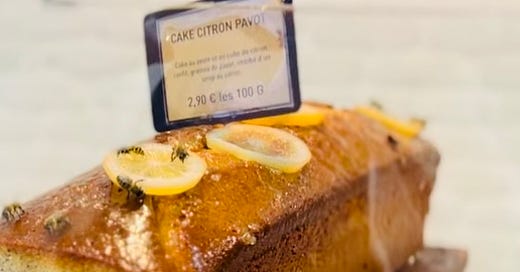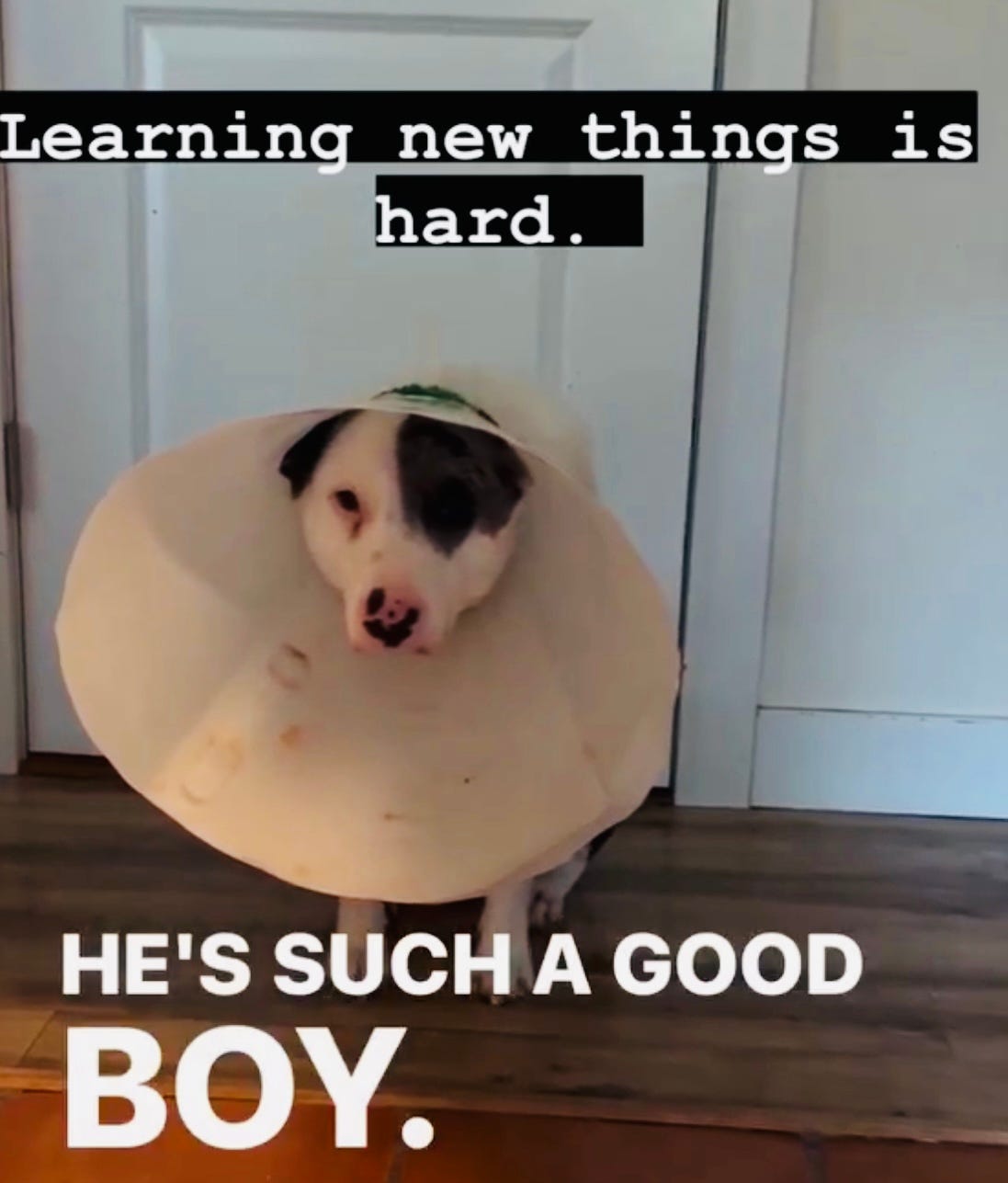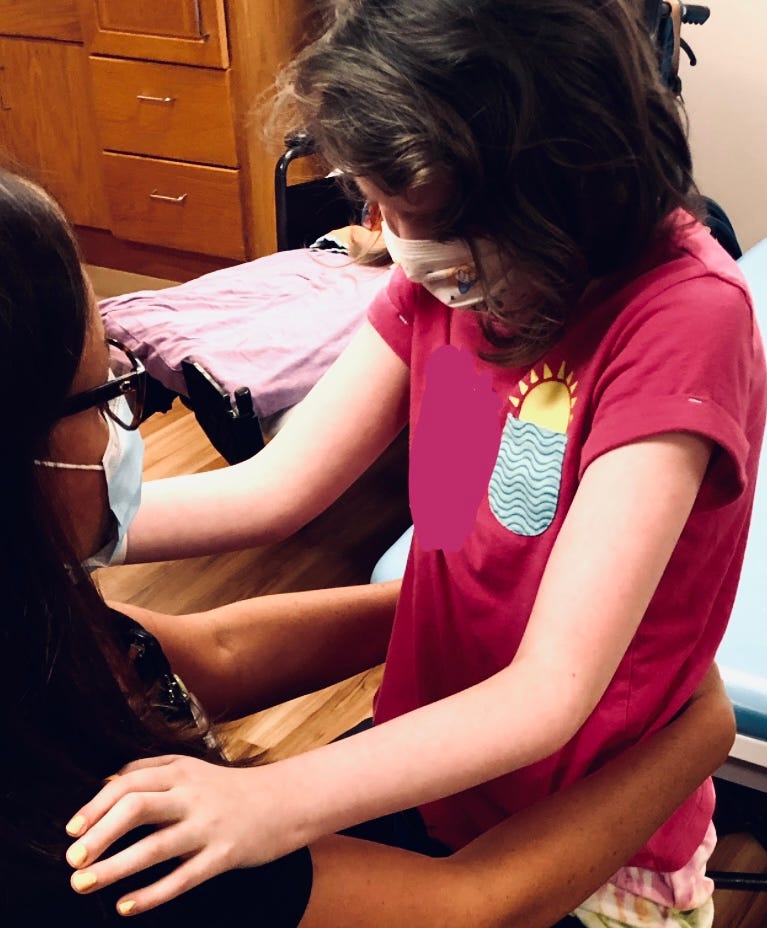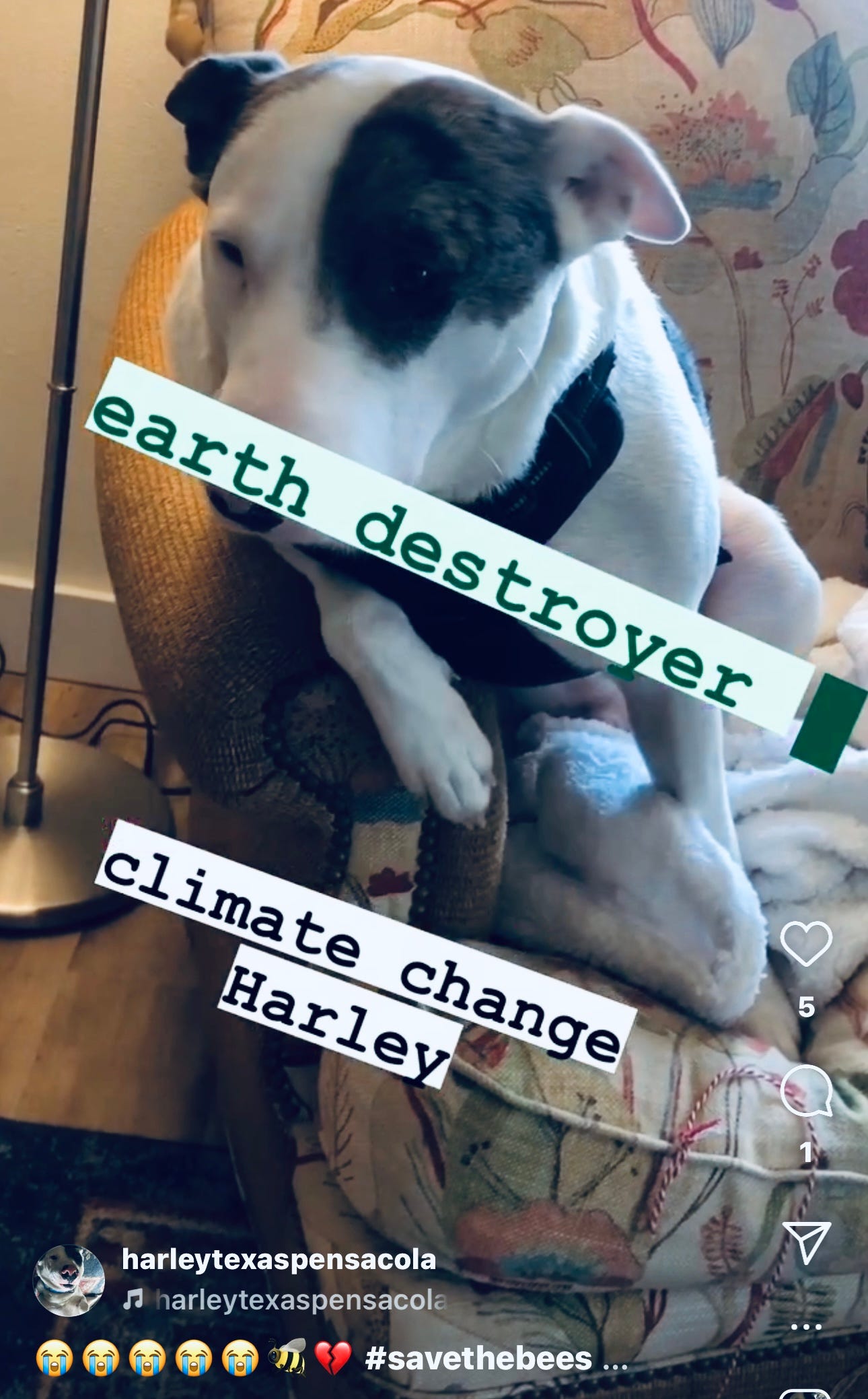In late summer, 2022, I was second in line in a small bakery in Paris. I shifted my weight in the muggy air, staring at the croissants piled in a glass case beside a pile of thin baguettes. I hadn’t had a croissant in seven years. I couldn’t remember the last time I had a decent baguette. My allergies kept me gluten free, but Parisians, I’d heard, had figured out the glory of flakey pastry without wheat.
Ahead of me in line, another blonde mom ordered an epic ton of little cakes, loaves, and tarts. Her four kids crawled all over her husband at a cafe table behind us. I took a deep breath, simultaneously wishing my kids were here and feeling grateful that I didn’t have to manage childcare in this heat.
Customers filed in, lining up behind me. The blonde woman asked her husband and the bakery attendant questions about the lemon tart, the quality of the fruit, the filling in the eclairs. Another attendant filled five large, white bags, wrapping each item in soft paper. The mom argued with one of her children about which little cakes to buy for later. The husband made a quiet comment about the size of the mini fridge at their hotel.
That’s when I noticed the bees, a dozen of them, crawling across the fruit and honey on the decorative loaves inside the case. I squatted down to watch them step through the sticky bread, flitting their wings and bumping into dried orange rinds and glazed berries. It’s a wonder these necessary but clumsy little critters have survived as long as they have.
Behind me, the line shifted and groaned. A man fanned his face with a flyer. I stood up in time to hear the woman behind me curse in French. The blonde mom said, I think that’s everything!
The attendants tallied her bill on a large calculator. The folks behind me sighed. Wind leaked in from the front door, cooling us just a little. The attendant gave the mom her total. The mom looked at it, frowning. We all watched her and pretended not to watch her. Just pay the fucking bill, I thought.
She looked back at her husband, then at me. I smiled. I felt it happen on my face without my permision. A small smile, but genuine. She smiled back, clicked her tongue, said, I don’t know…It’s just…I think we need…one or two…no…ten…baguettes.
It’s a true testament to my fragile maturity that I didn’t audibly snort. The attendant, however, rolled her eyes with her whole body and bent over to retrieve the bread. The mom turned to me and the line behind me and said, There’s nothing like this where we live.
I think this is a maximalist era. Too many. Too much. Too long. Too short. All of our narratives refreshed themselves at the end of January, that inescapable shift that politics plunges us into without warning or consent, and now that narrative stretches. Thirty days. Sixty days. Ninety. Too long. Not long enough to end. Not yet.
I remember the baguette lady, the too-muchness of her order. Maybe because I grew up hungry or because I’m from the deep south, where we put fresh bread in the fridge to keep it from molding, I will wonder forever how many of those baguettes they threw away. Why do I care? I wonder and bet against myself, years later. Two baguettes, surely they could’ve only gotten through two. They had so many more enticing pastries. Baguettes are kind of a nothing bread, an afterthought, important only if it is the only bread you can get your hands on. Temporary bread. Too short. Too hard by the end of the day, to save.
How much wasted bread is too much? And what if it’s not bread - but time? And are we all kind of like those skinny rice and potato loaves - wrapped delicately in whatever fabrics, waiting for some crushing fate - either chewed through the mouths of strangers, or dropped unceremoniously in the trash in a hotel room in one of the most beautiful cities in the world?
Scarcity helps my art. Abundance - whether it’s joyful or tragic - chokes me. Like I’m reeling and twisting through an impossible, relentless pause. I don’t want to feel anything, but of course I want to feel everything. I’m desperate for quiet, but inside of quiet, I’m terrified of what comes next. How do we, as I learned from my graduate mentor, Lidia Yuknavitch, write ourselves out of this particular story when this particular story feels like a kaleidoscope of endless, brutal hauntings, like we’re being chased by the moment we’re alive inside and the terrible possibilities of what comes next?
When I returned from Europe, a swarm of bees made a hive under my new backyard deck. Within a week, my dog, Harley, a lumbering, sweetheart pitbull, became an expert at catching these bees, hopping, leaping, and biting them out of the air. When they fell to the ground, he nudged them with his nose, surprised that the dead creatures did not burst back into life so they could play the bee catching game together, again.
In early fall, Harley obsessed over an ant bite on his front leg. Within a week, the tiny puncture grew to a large, round sore. Every day, the wound grew. When I took him to the vet, they found a bacterial infection and a fungus growing there. Every day for two weeks, I sprayed and wrapped his wound, gave him a ten minute break from the giant, plastic medical hood, then clipped it back around his neck. The sore healed, and I released him from his hood.
Within three days, he opened it back up, and I strapped the hood back around his head.
This two weeks on, three days off, two weeks on again routine went on for almost six months.
He’s a menace with that thing on, my partner said, touching the bruises on my quads where my dog accidentally ran his plastic hood into me several times per day. Depth perception, it turns out, isn’t a trick that an old dog can learn with a huge cone around his neck.
In the Paris bakery, I finally ordered my croissant, that last baguette, and a lemon tart. I watched the four kids follow their mom, her hands loaded with the white bags of gluten free treasures. Her husband returned briefly while I checked out, slipping the attendant a $20 bill and apologizing.
At the time, I thought, damn straight. I remembered all the cafes and restaurants where I’d worked in my teens and early twenties, how customers with huge orders felt like such a drag, their apparent wealth like a spotlight beaming across my desperation for a one-dollar tip.
I was so relieved when the family left. I wanted distance from them. I didn’t want the French folks to lump me into the American Karen category. Why the fuck do I care? I thought, as I left the bakery. Like I was embarrassed on this woman’s behalf. Like I had a good reason to look down on her for ordering like $300 worth of snacks for her family. What if they eat every single bite of those baguettes? I told myself I was being a classist dick, assuming my own authenticity because I grew up poor.
I tore into the croissant. How is it? my partner asked. I didn’t want to tell him it was burnt. I didn’t want to admit it had been a waste of time. Too many minutes of our precious vacation watching another person order bread. Do you remember Kara? I asked him.
What?
The physical therapist with the loud voice, I said. He shrugged, and I reminded him about the summer before when we’d traveled together from our home in Seattle to South Carolina for my daughter, Maggie’s, orthopedic surgery. It was her fourth surgery and the most extensive.
In the days after the operation, Maggie was nervous to walk or participate in PT - until Kara showed up. At first, I thought she was annoying with her booming, scratchy voice, not at all muffled by the mandatory face masks we wore 24/7 for the week Maggie was inpatient. BUCK UP! IT’LL BE FUN! Kara basically shouted at Maggie. She stood on the right of Maggie’s hospital bed, and I stood on the left. I, 2, 3, Kara said, Maggie took a deep breath, and we lifted the sheet under Maggie’s body, turning her so that her legs dangled off the bed. Maggie winced. Does it hurt? my partner asked. Maggie shook her head. IT’S AMAZING YOU’RE AMAZING, Kara said. Maggie smiled.
Over the course of two weeks, Maggie saw five physical therapists, but Kara’s sessions were always the ones that got her past any plateau. I warmed to Kara and started to enjoy her peculiar voice. So loud. So much fry. So, so much.
Because of the masks, I never saw Kara’s face. Just her hair, her eyes, and her voice.
The baguette lady sounded just like her. Same wispy blonde, and when she paused in the middle of her order spree and smiled, I smiled back. Kara? I thought for less than a second before womping back into my annoyance and judgment.
Who this person was didn’t really matter. In that heat, her whole body and life were swiftly reduced to something in my way, a hold up, a barrier to satiating my hunger, leaving the cafe, and carrying on with my vacation.
Maggie with a different PT after the big surgery.
That summer, when I first caught onto Harley’s bee destruction, I searched for ways to lure the wee critters to a new home. Nothing worked, and when I called local professionals, they said they were booked until fall. So, I surrendered.
In the mornings, I drank my coffee outside, and when a bee wiggled up from between the deck boards, I told it, Be careful motherfucker. I sprayed peppermint oil and sighed at the apparently totally not enticing flowers I’d planted across the yard. Zero bees found their way there.
Within minutes, my oaf of a dog would fly through the air, eyes wild, tongue out, ready to play with this tiny, new friend. When my dog inevitably destroyed the tiny, buzzing body, then looked at me, whining, I said , They don’t want to be friends with you, bud.
Sorry, I said to the pile of carcasses Harley left behind every afternoon as I swept them off the side of my deck.
The worst part was the way Harley used the cone of shame. After he killed a bee, it tumbled into his cone, and he swung his head, flying the bee back into the air so he could snap its little body again and again and again until it fell, unmoving, to the deck. Harley stamped his feet like an angry elephant. He walked back and forth between me and the unmoving bees, chirping and whining, licking my hand, like I could somehow change his reality.
Instead, I scratched behind his ears, grateful for the power of a sigh and a head pat, if you’re a dog.
I read somewhere that nearly a million books were published in 2024 globally, but only about 14,000 were reported in Publishers Marketplace. And still: 14k books is more than we’ll read in our lives. Even that number feels like noise. So many voices that voices become fabric, and if you’re a writer, it’s hard to feel specific when you know you’re just one of many, many threads.
And yet.
I’ve spent hundreds of minutes thinking about the baguette lady, whether she was Kara or not. I love my dog, but when the bees came back the following summer - and Harley was finally not encumbered by his hood - he completely destroyed the population of their hive within three weeks. The way storms wrecked whole neighborhoods when I grew up. The way whole airplanes swoop people out of their homes and lives, depositing them in a faraway prison. The way whole groups of people are targeted. The way joy feels hunted. So hunted. Too hunted.
How many years can we last in a world where joy feels hunted?
My favorite city in France was Biarritz, a coastal town with hard waves, great food, and a pretty statue at the end of a lit, rocky pathway. I grew up in a beachy vacation town, but Biarritz was a complete departure from my hometown and my real life. I loved it because it felt like an interruption. I love traveling because you never know what’s going to feel like an interruption, a precious, fleeting surprise. Like ear scratches and the small smiles between me and the baguette lady. Like the very best line written in each of those 14,000 books.
Like everyone, I want to shatter nightmares, and I don’t know if I can. Maybe there’s a way to enter the cracks in the nightmare, to write into them, to make the moments of pause into a canyon. Maybe someday the small, weird delights will outgrow the nightmare itself.









